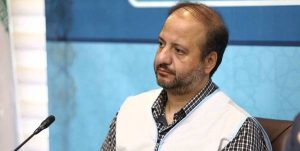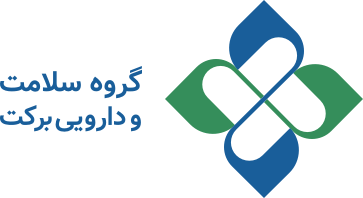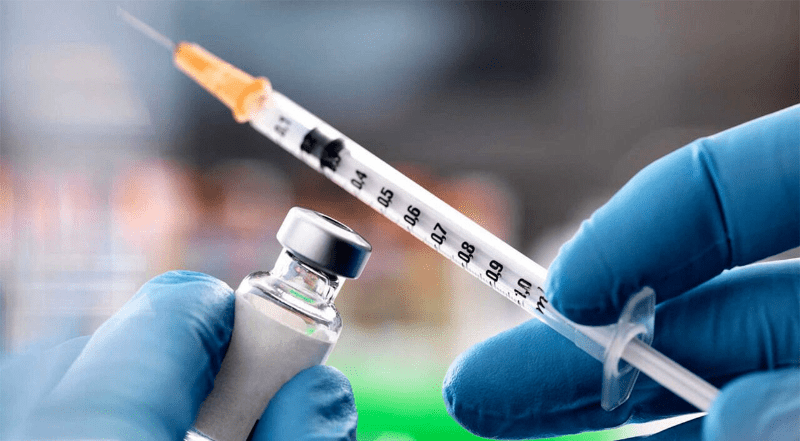
Iran’s Role in Development of Multivalent Vaccines for Global Pandemic Diseases
Barekat Health and Pharmaceutical Group:As one of the leading countries in the Middle East, Iran has focused considerable attention on the research and development of multivalent vaccines in recent years. By investing in biotechnology, fostering international scientific collaborations, and leveraging a skilled workforce, Iran seeks to enhance its position in global health diplomacy. This report examines Iran’s initiatives in the development of multivalent vaccines, its achievements and challenges, as well as the impact of these efforts on Iran’s health diplomacy.
Development of Multivalent Vaccines in Iran
- Iran’s Scientific and Research Capacities
Iran boasts advanced universities and research institutions in the fields of medical sciences and biotechnology, providing significant capacity for vaccine development. Leading institutions such as the Razi Vaccine and Serum Research Institute and Barekat Pharmaceutical Company are at the forefront of these efforts. These centers have recently focused on producing vaccines capable of combating multiple types of viruses or diseases, including combination vaccines for influenza and COVID-19.
- The Razi Vaccine and Serum Research Institute, one of Iran’s oldest and most respected research institutions, plays a crucial role in the production of vaccines and serums for infectious diseases. The institute has also been active in researching and developing recombinant vaccines and inactivated virus vaccines to tackle new viruses such as COVID-19 and influenza.
- Barekat Pharmaceutical Company, a subsidiary of the Execution of Imam Khomeini’s Order (EIKO), is one of Iran’s largest and most pioneering pharmaceutical companies, specializing in the production of recombinant vaccines and biotechnology drugs. In recent years, the company has focused on major projects such as the production of COVID-19 and influenza vaccines.
- Utilization of Advanced Technologies
Iran has made significant strides in producing multivalent vaccines by employing advanced technologies such as mRNA, nanoparticles, and novel viral vector platforms. The mRNA technology, first used in COVID-19 vaccines, is now being explored in Iran for the development of vaccines that can simultaneously combat multiple diseases.
- mRNA technology, due to its high efficacy in producing fast-acting vaccines, is being pursued in Iran for the development of multivalent vaccines. This technology enables Iran to produce vaccines targeting multiple respiratory and viral diseases at once.
- Nanoparticles are also being utilized in the design of multivalent vaccines in Iran. Due to their properties, such as enhanced stability of vaccines and improved immune response, nanoparticles are employed in the production of modern and combination vaccines.
- International Collaborative Projects
In recent years, Iran has collaborated with countries such as China, Russia, and Cuba on key vaccine research projects. These collaborations have facilitated the exchange of technical knowledge and accelerated the vaccine production process, positioning Iran among the countries committed to scientific diplomacy through vaccine development.
- Iran and China have had extensive cooperation in producing recombinant and combination vaccines. This collaboration, particularly during the COVID-19 pandemic, has expedited the production of Iranian vaccines.
- Iran has also collaborated with Russia and Cuba on joint projects to produce vaccines against COVID-19 and influenza, resulting in technology transfer and scientific information exchange.
Impact of Multivalent Vaccines on Iran’s Health Diplomacy
- Increasing Regional Influence
Through the production of multivalent vaccines, Iran can play a significant role in meeting the health needs of neighboring countries and the region. This not only enhances public health in the region but also consolidates Iran’s position as a scientific and humanitarian hub.
- The production of multivalent vaccines allows Iran to export its vaccines and medicines to neighboring countries, thereby meeting their health needs.
- Through this policy, Iran can strengthen its bilateral relations with regional countries, enhance its political and economic influence, and assist in resolving health crises.
- Strengthening International Cooperation
The development of multivalent vaccines in Iran can serve as a platform for further scientific cooperation with advanced countries. These collaborations allow Iran to benefit from cutting-edge technologies while also playing an important role in health diplomacy.
- Given Iran’s progress in producing modern and combination vaccines, the country can participate in joint research programs with more advanced countries and take a more prominent role in global health and technology, particularly in the field of public health.
- Barakat Pharmaceutical Company, using innovative technologies and international collaborations, is expanding its scientific and commercial networks. These collaborations, especially in vaccine and biotechnology production, strengthen Iran’s global standing.
- Fighting Sanctions Through Domestic Production
One of Iran’s major challenges in the health sector is economic sanctions, which restrict vaccine and medical equipment imports. The production of multivalent vaccines not only helps Iran achieve self-sufficiency but also creates export opportunities.
- By producing domestic and multivalent vaccines, Iran can reduce its dependency on imported vaccines and, at the same time, export its vaccines to various countries. This boosts the domestic economy and enhances diplomatic and commercial relations with other countries.
Successful Examples in Iran
- COVPars Vaccine
COVPars is a recombinant vaccine developed by the Razi Institute, which is compatible with other vaccine platforms. Designed to combat the COVID-19 virus, it is Iran’s first domestically produced recombinant vaccine. - Barekat Pharmaceutical Company’s Research Programs
Barekat Pharmaceutical Company is one of the pioneers in multivalent vaccine production, working on combination vaccines for influenza and COVID-19. In recent years, the company has made significant strides in developing combination vaccines using innovative technologies.
Challenges and Obstacles in the Development of Multivalent Vaccines
Despite significant progress in producing domestic vaccines, Iran faces challenges that may impact the development of multivalent vaccines:
- Economic Sanctions: International sanctions against Iran, particularly in the pharmaceutical and medical equipment sectors, are among the main obstacles to domestic vaccine production. These sanctions have created financial limitations and posed challenges for importing essential raw materials and equipment for vaccine production.
- Financial Shortages: Developing advanced vaccine technologies such as mRNA and nanoparticles requires substantial investment. However, Iran faces various financial difficulties, which may slow the development of multivalent vaccines.
- Reduced Global Competitiveness: Despite good progress in domestic vaccine production, Iran faces challenges in competing with countries such as the United States, China, and members of the European Union due to a lack of advanced infrastructure and technologies.
Government Support and Roadmap for the Future
In recent years, the Iranian government has provided significant support to the pharmaceutical industry and domestic vaccine production. These initiatives include allocating special budgets for the research and development of domestic vaccines, easing regulations for drug and vaccine registration, and supporting technology startups in this field. However, challenges in transparency and coordination among various entities still remain and need to be addressed.
One of Iran’s strategic plans in this sector is to support knowledge-based and technology companies in producing innovative vaccines. Barekat Pharmaceutical Company, one of the pioneers in this field, is working with extensive scientific research centers both inside and outside the country to become one of the regional leaders in multivalent vaccine production. In addition to vaccine production, the company is also active in the production of advanced medical equipment and pharmaceutical raw materials, which directly impact the production of vaccines and modern drugs.
Scientific and Research Cooperation with Other Countries
Since the production of multivalent vaccines requires the use of complex and advanced technologies, Iran’s international cooperation with scientifically advanced countries is of significant importance. Iran has had extensive collaborations with countries such as China, Russia, and Cuba in this field.
- Cuba, a leader in recombinant vaccine production, has collaborated extensively with Iran in technology transfer. Cuba, known for its expertise in multivalent and recombinant vaccines, has shared valuable experience with Iran.
- China, which has achieved significant success in COVID-19 vaccine development, has strengthened its joint cooperation with Iran in vaccine production and technical knowledge transfer. These collaborations have not only led to the exchange of knowledge and technology but have also increased trust and diplomatic relations between the two countries in global health.
Economic Impact of Multivalent Vaccines on Iran
The production of multivalent vaccines not only strengthens the country’s healthcare infrastructure but can also have positive economic impacts. By expanding the production of domestic vaccines and exporting them to neighboring countries and even global markets, Iran can play a crucial role in improving its economic situation.
- Export Opportunities: By producing domestically developed vaccines and succeeding in clinical trials, Iran can become a major vaccine exporter in the region. This could boost Iran’s pharmaceutical industry and reduce its reliance on imports of foreign vaccines and drugs.
- Strengthening Industrial Infrastructure: Vaccine production requires advanced and complementary industries for manufacturing and packaging. This will strengthen other industrial sectors in the country as well.
- Job Creation and Technology Development: The growth of the vaccine industry will create job opportunities across various sectors, including research, production, and support, contributing to the country’s technological development.
Outlook for Multivalent Vaccines in Iran
Iran is striving to become a global leader in vaccine production, particularly multivalent vaccines, by leveraging indigenous knowledge and international progress. Iran’s health strategy focuses on producing vaccines that can simultaneously cover multiple related diseases, such as influenza, COVID-19, and other respiratory diseases. This approach not only helps reduce treatment and prevention costs but also strengthens the country’s research infrastructure.
- The future of multivalent vaccines in Iran looks very promising. Iran has already taken significant steps in this direction and may become one of the global vaccine production hubs in the future.
Conclusion
The development of multivalent vaccines in Iran, in addition to strengthening the country’s healthcare and scientific infrastructure, could solidify Iran’s position as a vaccine production powerhouse in the region and even globally. Despite various challenges in this development process, Iran has made great strides with its internal capacities, international collaborations, and scientific advancements.
Iran’s strategic future plans for producing multivalent vaccines, including the use of new technologies such as mRNA and nanoparticles, could usher in significant transformations in the country’s vaccine industry. Accordingly, Iran is not only set to become a regional vaccine production hub but could also play a pivotal role in global health diplomacy
-
دیدار و گفتگوی هیئت وزارت صحت و عامه افغانستان با مدیران برکت
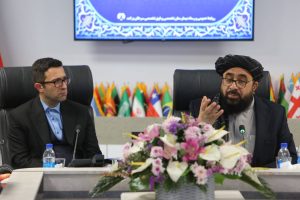
-
راه یابی تیم دفاع شخصی پخش یاراطب به مرحله کشوری|کسب جواز حضور در مسابقات آسیایی 2026
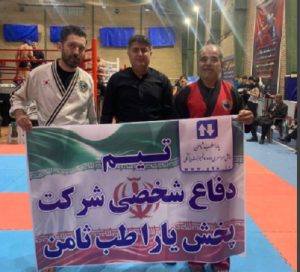
-
بازدید نایب رئیس گروه سلامت و دارویی برکت از بخش CSR بیمارستان سرطان برکت

-
حضور قدرتمند گروه سلامت و دارویی برکت در نمایشگاه «افغان هلث»؛ ارتقاء همکاریهای منطقه ای در حوزه سلامت
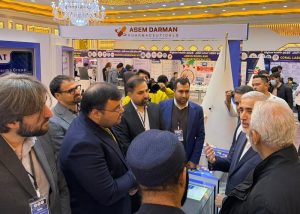
-
معاون وزیر بهداشت، رئیس سازمان غذا و دارو و مدیرعامل گروه سلامت و دارویی برکت در سبحان انکولوژی
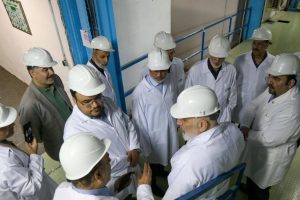
-
بازدید مدیرعامل گروه سلامت و دارویی برکت از شیراز سرم
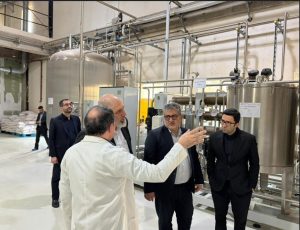
-
بازدید مدیرعامل گروه سلامت و دارویی برکت از البرزدارو
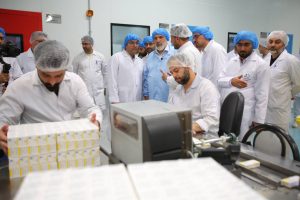
-
داروی هوشمند، انقلابی در درمان چاقی
